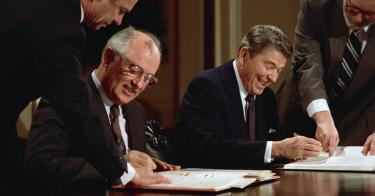Within certain circles, the belief persists that all arms control agreements are inherently good. These same individuals and organizations argue that, even when one of these agreements is revealed as deeply flawed, abridged by other signatories, or disadvantageous to the United States, our nation should remain a party to the pact and try, over time, to fix it.
This perspective was on full display as the United States withdrew from the Intermediate-Range Nuclear Forces Treaty—an action taken officially on Aug 2, 2019. Yes, there were mountains of evidence that Russia had violated the treaty regularly since at least 2014—and likely started a decade earlier. And, yes, the action came only after years of comprehensive efforts by both the Obama and Trump administrations to persuade Moscow to resume compliance. Still, the administration was, in some quarters, excoriated for withdrawing.
“U.S. withdrawal from the INF Treaty is a loser all around,” wrote Brooking’s Steven Pifer. Former Secretary of State George Schultz and former Soviet Union President Mikhail Gorbachev agreed, arguing that the answer was “not to abandon the INF Treaty but to preserve and fix it.”
Little mentioned was the fact that the United States had labored for at least five years to move Russia back into compliance with its treaty obligation—with zero success. As the saying goes, “it takes two to tango.” And Russia was not interested in dancing. By remaining in a one-sided treaty, U.S. national security was being seriously compromised.
In the Cold War era, our thinking about the role and purpose of arms control was clearer. In 1961, Thomas Schelling and Morton Halperin defined arms control as all “forms of military cooperation between potential enemies in the interest of reducing the likelihood of war, its scope and violence if it occurs and the political economic costs of being prepared for it.”
Nowhere in that definition is there room for an agreement where one side faithfully meets its obligations while the other purposefully—and over the course of multiple years—violates the terms of the agreement, thereby gaining a material advantage, and when challenged, refuses to acknowledge it, nor changes its ways.
Former Yale professor Dr. John Maurer suggests there are three main reasons to pursue arms control: to achieve a level of disarmament; to obtain stability, or to gain or maintain an advantage. No matter the basis for arms control, each of these purposes requires a sober and continuing evaluation as to whether the agreement is indeed serving its intended role in protecting the interests of the United States.
Arms control has been around as long as warfare. Sparta’s 405 B.C. demand that Athens destroy its “long walls” protecting access to the port of Piraeus was an attempt at arms control to maintain advantage. The INF treaty was an example of an agreement pursuing disarmament of a class of weapons. The New START treaty on the other hand values predictability.
U.S. policy makers have already begun to debate the extension of New START which expires in 2021. The treaty entered into force in 2011 and places limits on nuclear warheads and delivery systems.
Already some commentators are mounting emotional appeals to extend the agreement, pleading we “find ourselves on the brink of an era without nuclear arms control whatsoever.” Similarly eight Democratic congressman recently wrote President Trump that forgoing “the benefits of New START by failing to extend the agreement would be a serious mistake for strategic stability and U.S. security.”
Certainly arguments can be made for extending New START. Foremost among them is the fact that the United States has allowed its nuclear modernization infrastructure to deteriorate so badly that it is in a poor position to begin producing new nuclear weapons, while Russia’s massive nuclear modernization effort is about 80 percent complete. If the lapse in New START were to precipitate the need for the United States to build new nuclear weapons, the nation is poorly prepared.
But there are significant shortcomings with New START as well. The treaty ignores new developmental Russian nuclear programs that include a nuclear cruise missile, unmanned underwater nuclear vehicle, and hypersonic missiles. Russian overwhelming advantages in tactical nuclear weapons are not considered. The New START verification regime is limited. These factors must be weighed seriously.
And New START is not the only treaty under the microscope. The administration is already laying the groundwork for a review of the Open Skies Treaty (OST). The treaty permits states to conduct short-notice reconnaissance flights over the others’ territory. The treaty entered into force in 2002, and today 34 states are party to it. Some 800 flights have taken place under this treaty. Last week at a meeting in Brussels, it was reported that the administration “laid out for the first time a full suite of concerns with the treaty and made clear they were seriously considering an exit.”
We don’t yet know the administration’s full concerns about the OST, but some question the value of manned reconnaissance flights in an era of widely available satellite intelligence. Russian prohibitions on OST overflight of Kaliningrad and parts of the country of Georgia has been an issue. Proponents of the treaty on the other hand point to the goodness and confidence created by a large multilateral treaty involving 34 nations.
Crucial to both of these discussions, as well as the evaluation of future agreements, are clear-eyed assessments of the value of the agreement to U.S. national security. Within those debates, the maintenance of international harmony or the potential disruption to the arms control status quo are not germane.
That the United States should reflexively seek to remain in arms control agreements, even if they do not contribute to U.S. national security, is a bad idea in national security.
This piece originally appeared in Defense 360



